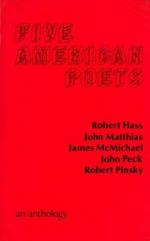|
This section contains 6,131 words (approx. 21 pages at 300 words per page) |

|
SOURCE: "Robert Pinsky and the Language of Our Time," in Salmagundi, No. 103, Summer, 1994, pp. 155-77.
In the following essay, Longenbach traces the development of Pinsky's unique poetic vision.
Robert Pinsky has always stood apart from the various schisms used to map the world of American poetry. He not only admires both the formal terseness of Cunningham and the capacious waywardness of O'Hara; his poems also seem to partake of both these qualities. Formal and free, open and closed, Olson and Wilbur—however the twentieth-century American poetry is divided, Pinsky remains unplaceable in the best sense of the word. He has recently said that Seamus Heaney seems legitimately "post-modernist" because in his work, "formal freedom feels assumed, and matters of technique no longer fighting issues in the old modernist sense." This quality seems to me even stronger in Pinsky's own work. If he is a postmodern poet it is...
|
This section contains 6,131 words (approx. 21 pages at 300 words per page) |

|


